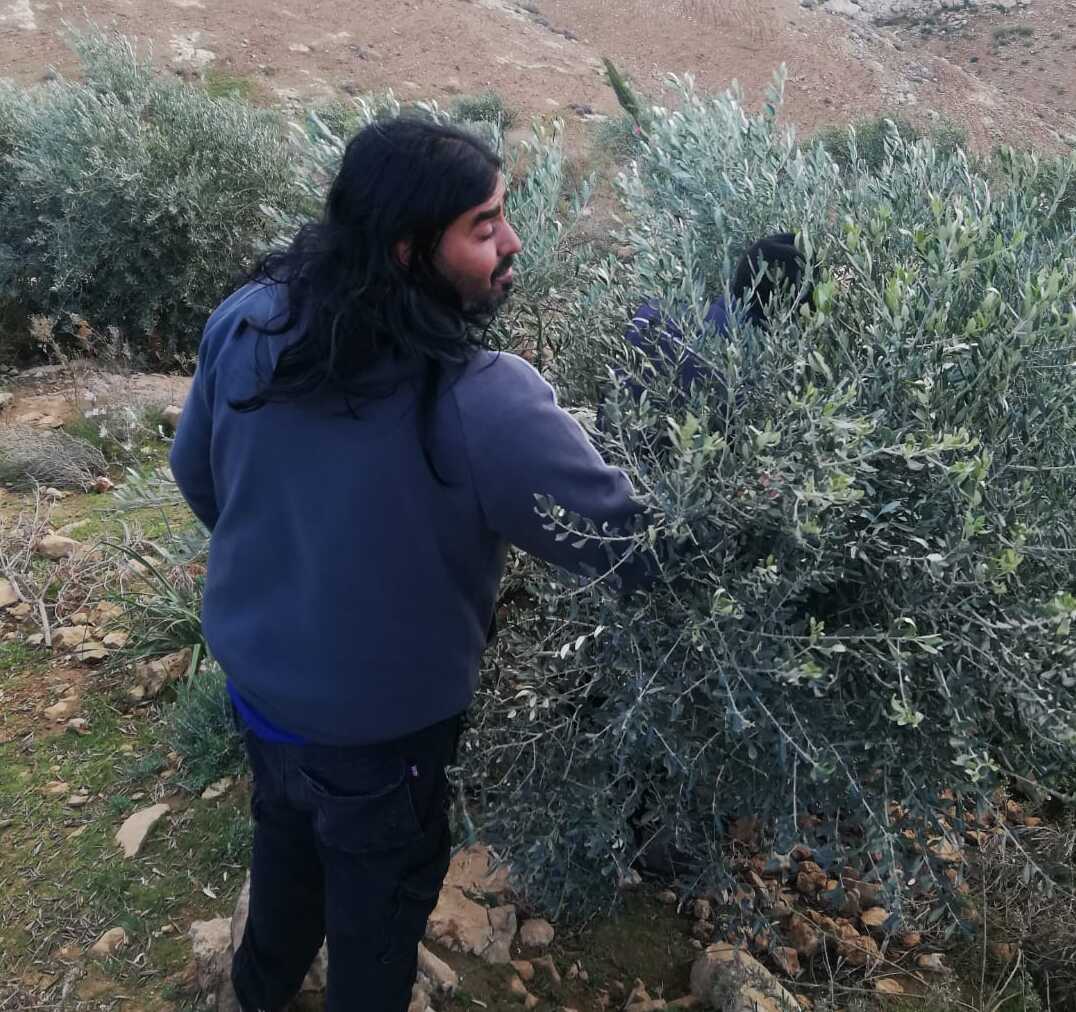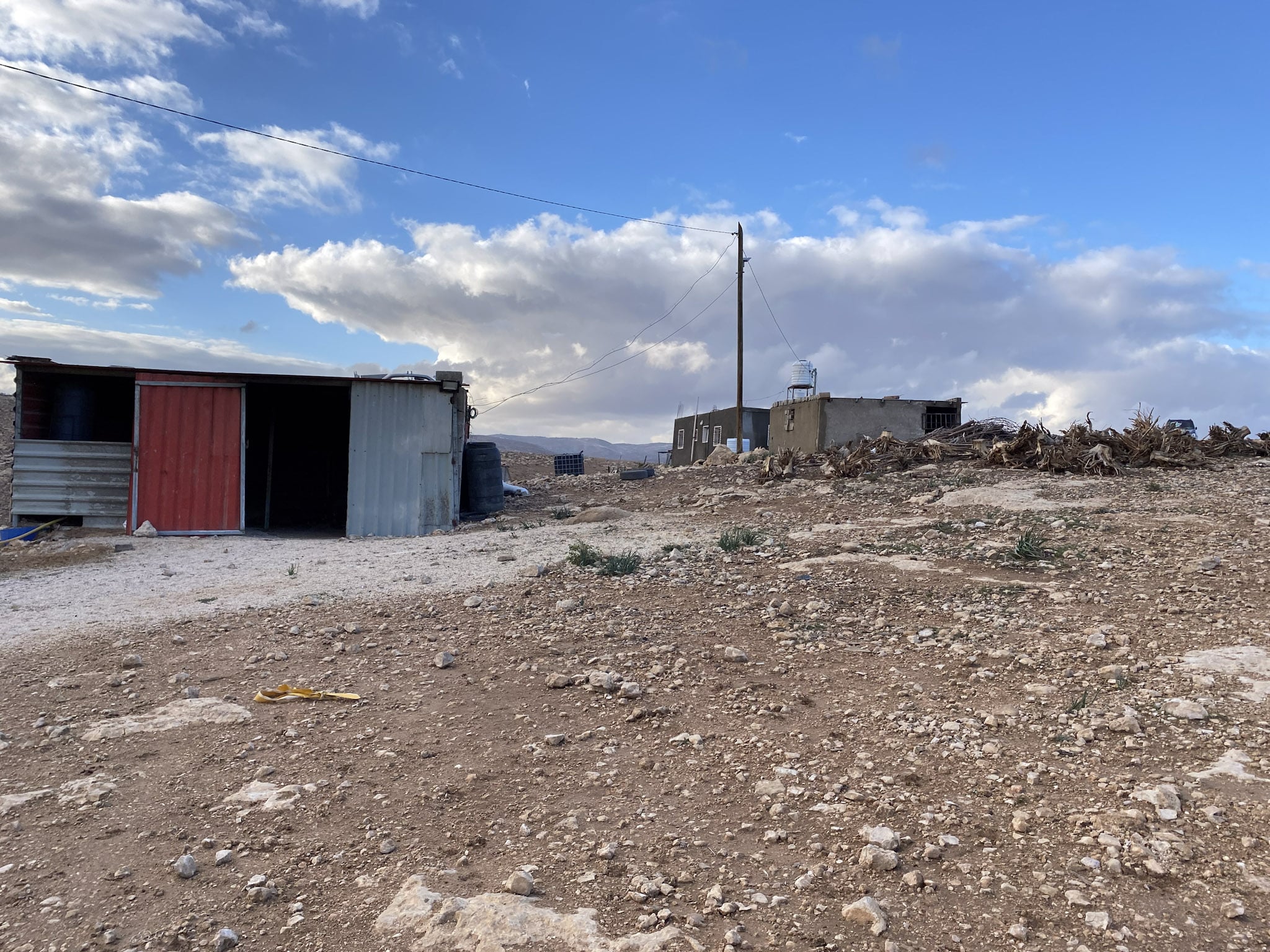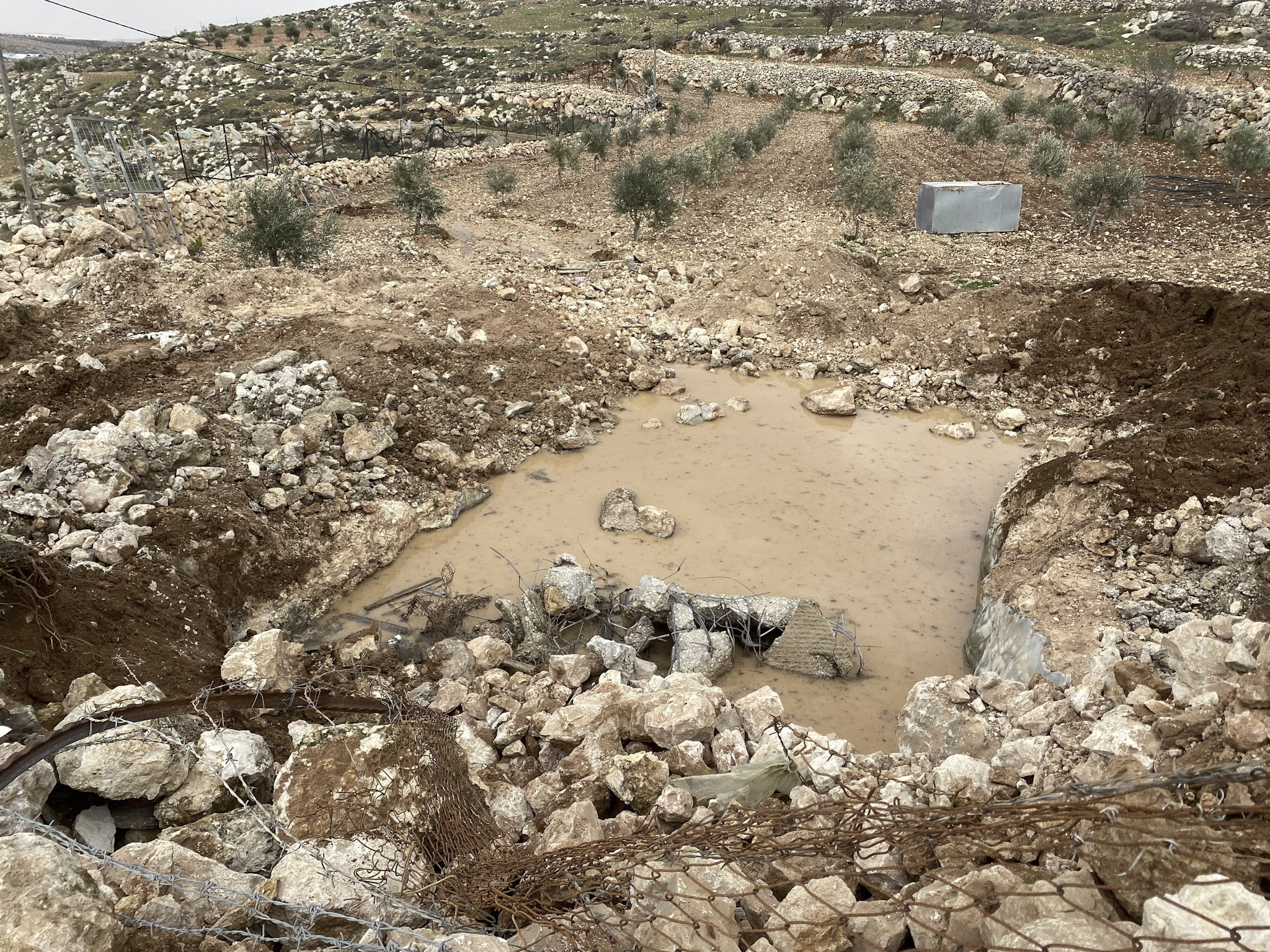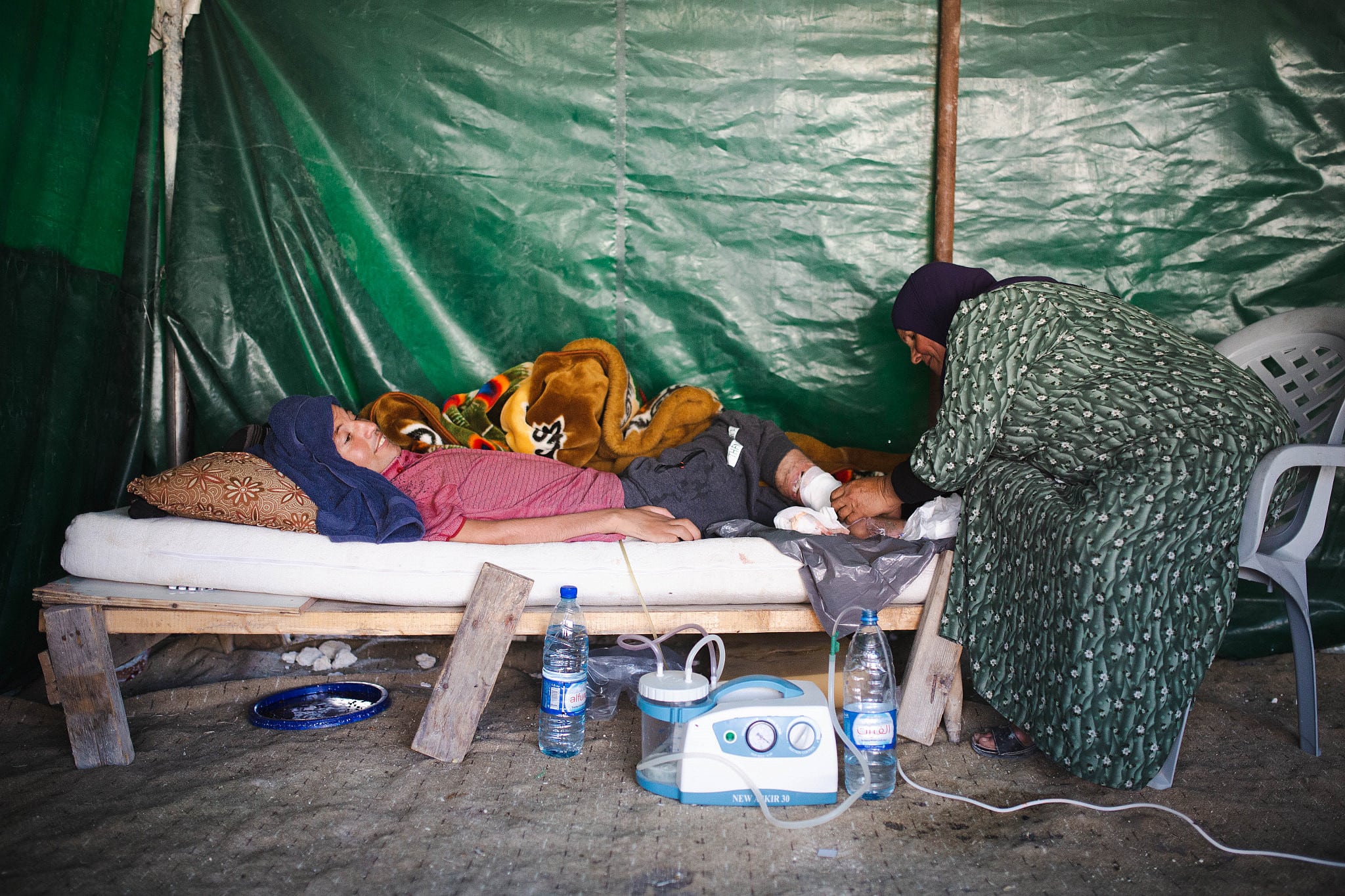‘There can be no health without mental health and everyone is entitled to an environment that promotes health, well-being, and dignity.’
Khalil, welcomed us into a barn with a firepit. It was a cold February day and the fire provided much needed warmth. He made us hot, aromatic coffee following the Bedouin tradition of roasting the coffee beans in the open flame of the fire and rhythmically crushing them in a tall metal jug called a ‘mehmas’. The hospitable welcome contrasted the sobering reality of Khalil’s situation. Two months ago, he received a ‘stop work order’, an Israeli military order which prohibits Palestinians from repairing and developing their homes. This is usually a precursor to a demolition order.
This week, the demolition order arrived. Khalil has six children, one of whom is disabled and requires assistance to move and to eat. His family have owned land in this area since the 1920’s and they have Jordanian ownership papers. He is not the only member of his family to receive a demolition order. Four nearby houses and structures such as barns, sheep shelters and water tanks have had the same notification. Three out of the four houses are owned by Khalil’s brothers. We listen to details of his wider family and realise that thirty-two children will lose their homes. He does not know when his home will be demolished. A convoy of bulldozers and army personnel could show up any day.
Khalil invites us to walk around his property. He has 25 goats and 85 olive trees. He used to have camels, but the cost of feed means that he cannot make a living from them. He is fighting the demolition orders in the Israeli courts, but the odds are stacked against him. He is concerned how the family will cope with the disability of his daughter if they lose the security of their home. Home demolitions often lead to a deterioration in living conditions and significantly impact health and wellbeing.

Khalil with his olive trees
Khalil’s home is in Area C of the West Bank, where Israel retains full military control. The Israeli government states that their demolition policy is justified as Palestinian homes are being built here without planning permission. However, whilst Israeli settlements expand, the odds of a Palestinian receiving a building permit in Area C, which makes up over 60% of the West Bank, are ‘slim to none’. Between 2009 and 2018, only 98 construction permits were issued out of 4,422 requests filed. Like many Palestinians, in order to meet the needs of a growing family, Khalil took the risk of building on his land without a permit.
‘The odds of a Palestinian receiving a building permit in Area C – even on privately owned land – are slim to none. Given the futility of the effort, many Palestinians forgo requesting a permit altogether. Without any possibility of receiving a permit and building legally, the needs of a growing population leave Palestinians no choice but to develop their communities and build homes without permits. This, in turn, forces them to live under the constant threat of seeing their homes and businesses demolished.’

Khalil’s farm
The military occupation poses substantial risks to the mental and physical wellbeing of Palestinians, whilst severely curtailing their access to healthcare provision. The life of Harun Abu Aram demonstrates how home demolitions and the confiscation of other essential resources compounds this issue.
In 2020, Harun’s parents’ home, which included space for him and his fiancée, was demolished. The family had no choice but to live in a cave which is a common form of resistance to being forced off one’s land due to a house demolition.
On 1 January 2021, Harun’s 24th birthday, he rushed to help his neighbour because Israeli soldiers were confiscating a communal electric generator. The Israeli authorities prohibit Palestinians from building or hooking up to any infrastructural networks in Area C, such as water and electricity to power their dwellings. Harun tried to grab the generator from a soldier and was shot and left paralysed.
According to Harun’s family, Israeli authorities refused to call an ambulance to the scene and when family and neighbours tried to drive him to safety, soldiers shot at the tyres of their vehicle. Video footage (warning: distressing footage) showed that Harun was barefoot and unarmed as together with three other unarmed men, he tried to keep the means to energy in their shepherding community. A quote from Shireen Abu Akleh, the renowned Palestinian journalist at the time was;
‘Only in Palestine, the occupation controls the drop of water you drink, denies your electricity and destroys your homes. What threat did Harun pose?’
The European Union called upon Israel to investigate his shooting and bring perpetrators to justice. The Israeli military investigation took two years. The case has been closed with no prosecutions nor compensation to the family. The conclusion was that the soldiers acted in ‘defence’ and faced a ‘clear and present risk to their lives’.
Harun died aged 26 on 14th February 2023, whilst I was visiting the South Hebron Hills. His death was a source of much sadness and regret locally.
Harun’s gunshot wound led to paralysis from the neck down and the blockage of his leg arteries. One of his legs was amputated, and he developed severe ulcers in his leg and pelvis, as well as infections in his lungs. Shortly before he died doctors advised that his other leg needed amputation.
The military refused to grant Harun’s family permission to build a home for him. His family was also not allowed to build a road which would have enabled him to be moved easily, so they continued to live in a cave with rudimentary provisions. A friend said:
‘Harun insisted on living in Rakeez, his home village. With the sheep and goats he loved, with the spaces he knew, with the morning scents and the desert evenings’ chill.’
The Israeli authorities do not allow the construction of permanent healthcare facilities in Area C. 50% of the Palestinian population living in Area C have to travel over 30 kilometres to the nearest clinic, while 23% have no access to healthcare facilities at all.
Israeli settlements in the West Bank have modern clinics and easy access to hospitals. Israel’s policy of separation between East Jerusalem, the wider West Bank, and Gaza is a key barrier to the creation of a unified, effective system of healthcare for Palestinians. The restrictions on freedom of movement and the use of permits also allows Israel to restrict access to medical provision and the movement of healthcare workers.
The pace of demolitions carries on. Our monitoring team have witnessed six house demolitions in the area over the seven weeks we have been here; the destruction of a large agricultural water cistern as well as demolitions of olive trees by the Israeli authorities.

Demolition of agricultural water cistern

Olive tree demolition
Last May, the Israeli Supreme Court authorised the army to evict over 1,200 Palestinian residents from their homes in Masafer Yatta, South Hebron Hills, to make way for a military firing zone. All legal avenues to appeal have been exhausted and residents expect that a mass forced eviction could happen at any time. According to the humanitarian organisation, Medicins San Frontieres (MSF), the increase in home raids and demolitions in the area has led to a sharp increase in the demand for mental health support.
‘Over the past year, we have witnessed first-hand the impact of the increasingly coercive environment on the physical and mental health of the people in Masafer Yatta. As a medical humanitarian organisation, we denounce the Israeli policies and call on Israeli authorities to bring an immediate halt to the eviction plan and to stop implementing measures that restrict access to basic services, including medical care, for Palestinians in Masafer Yatta. This unnecessary suffering must stop.’
Take action!
-
In the UK? Add your name to this urgent campaign from Medical Aid for Palestinians. It takes just one minute to call upon the UK government to pressure Israel to end its violations against Palestinians’ rights to health and dignity.
-
Consider helping to rebuild a demolished Palestinian home as an act of nonviolent resistance. You can donate funds towards the building costs or join a trip and help with the rebuild – no previous experience required. Subscribe for updates on upcoming trips offered by Amos Trust and the Israeli Committee Against House Demolitions.
-
Read about The Parents Circle – Families Forum (PCFF). It is a joint Israeli-Palestinian organisation of over 600 families, all of whom have lost an immediate family member. The organisation promotes dialogue in education, public meetings and in the media.


